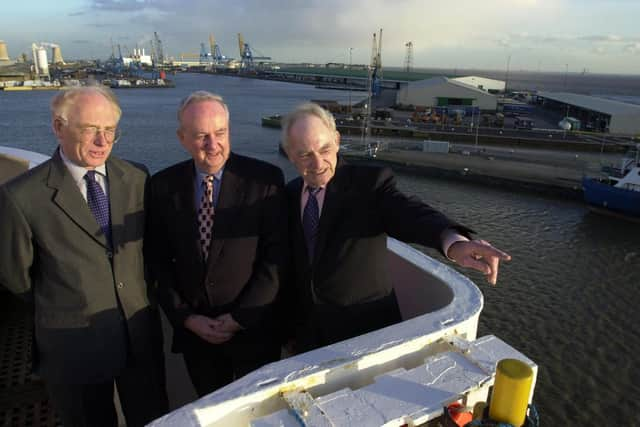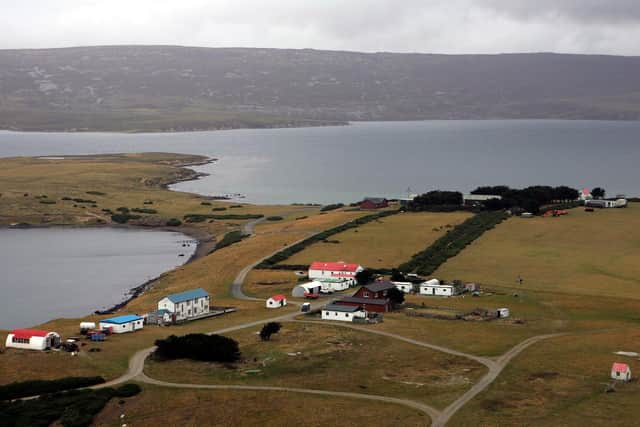How the Hull-based ferry Norland showed courage under fire as it took the Paras to fight in the Falklands
As the Argentine Air force closed in on the troopship Norland, Bob Lough and his crew knew they were about to face the challenge of their lives.
In happier times, the Norland was used as a roll on, roll off ferry, ploughing the generally placid seas between Hull and Rotterdam.
Advertisement
Hide AdAdvertisement
Hide AdBut the Argentinian invasion of the Falklands had changed all that. As a task force was assembled with the goal of retaking the islands, the Ministry of Defence called on the Norland to act as a troopship. Now she was in the line of fire.


The Argentinians had swiftly captured the Falklands on April 2 1982, after claiming sovereignty over the islands for decades, despite the inhabitants’ dogged determination to remain British. In response Margaret Thatcher’s Government had put together a task force to reclaim the islands and expel the invaders.
Mr Lough, from Hull, who was the chief officer on board Norland during the Falklands campaign, recalled: “Norland was one of the last ships requisitioned because the MOD decided to add 2 Para to the landing force and they needed a ship to take them.
"The ship was going on a bit of an adventure and they wanted an experienced officer on board, so I said, 'Yes.”
Advertisement
Hide AdAdvertisement
Hide AdNorland was among the ships chosen to enter San Carlos water on the Falklands to offload troops, which placed its crew in obvious danger.


"They needed an extra landing ship and they asked if if we would be prepared to do it,’’ said Mr Lough. "We all just got on with it. Morale had been excellent on the way down and there was a bond between the Norland crew and the Paras.
“Norland was actually the first ship to enter San Carlos water. We anchored at Chancho Point to put all the troops into the landing craft. When I asked our senior Naval Officer why we were leading the way he replied. “Because we are not sure if it is mined.”
The Norland was attacked by the Argentine air force in San Carlos but didn't receive a direct hit. Others were not so lucky.
Advertisement
Hide AdAdvertisement
Hide Ad"There were lots of flashes and bangs,’’ said Mr Lough. “It was like watching a war movie, but you were part of what was happening on the screen.”
After combat by land, sea and air, a ceasefire was agreed on June 14 and the Falkland islanders were liberated. Mrs Thatcher’s reputation reached its zenith and she swept to victory at the next election. In Argentina, the defeat led to the speedy demise of the ruling military junta.
“Everybody was delighted when the war was over. Public opinion was dead set against the Argentinians,’’ said Mr Lough. “I was very proud of the crew who had all done an exceptional job.”
But victory had come at a price. Some 253 British servicemen had been killed and 775 were wounded. Argentine casualties were much higher; with 649 killed and more than 1,600 wounded.
Advertisement
Hide AdAdvertisement
Hide AdDominic Sandbrook, in his book Who Dares Wins, argues that the Falklands War was a genuine turning point in British history, even providing a new national myth to rank alongside D-Day and the Battle of Britain.
He said: “No scriptwriter could have provided more endearing victims, a cast of harmless sheep farmers who might have just walked out of the Archers; or more fiendish adversaries, a South American junta who specialised in torturing their own people. And the pictures of the little green figures with their enormous packs, trudging stoically across the windswept moorlands, played perfectly to the self-image of an indomitable island race, never happier when the weather was miserable and the odds were against them.
“Once again Britain had been written off. Once again Britain had stood alone. Once again Britain had prevailed.”
But why did the British people feel such a deep affinity with the Falkland Islanders?
Advertisement
Hide AdAdvertisement
Hide AdThis is a good question, according to Lawrence Black, Professor of Modern British History at the University of York
He said: “There are lots of stories of ministers having to dig out maps to look up their location. If you'd asked the average Briton in 1981 where the Falkland Islands were, you'd have got mostly 'don't knows'.
“But an affinity was rapidly built up, largely through political rhetoric and the emotional ties to the military.”
Falklanders seemed more like an English-speaking, white, hardy imperial type of Briton, according to Professor Black. Britain’s decision to send its military to rescue them from a tyrant had obvious resonances with the Second World War.
Advertisement
Hide AdAdvertisement
Hide AdHe added: “And these were woven by Thatcher into a rhetoric of restoring Britain's place in the world, that appealed to patriotism.”
“Historians would call the Falklands a late colonial conflict, a remnant of empire.”
The lasting legacy of the conflict was three-fold, according to Professor Black. It created the myth of the 'Falklands Factor', that a patriotic war could yield electoral advantage and ended the “trauma” mentality, linked to the national humiliation of the Suez crisis of 1956.
“As a unilateral action - the US were officially neutral, if tacitly supportive - it also furnished Thatcher's image as a strong decisive leader, a Cold Warrior.” he added.
Advertisement
Hide AdAdvertisement
Hide AdIt also highlighted Britain's reluctance or inability to forego an imperial role, however arcane, according to Professor Black.
The Falklands War may also have had less of an impact on the 1983 general election than frequently supposed, according to Professor Black.
He said: “By June 1983 (over a year later), the economy was showing signs of recovery, where inflation and unemployment had been at crisis level in 1981-2. Inner city conflict of the sort seen in 1981 was receding. The key factor in giving Thatcher such a victory was the presence of the new SDP-Liberal Alliance, which helped divide the non-Conservative vote. Expressions of strong support for the Falklands war were common and popular, but that was very rarely what people were voting on.
“I'm not saying there was no 'Falklands Factor', but there were other factors.”
But could the conflict happen again?
Advertisement
Hide AdAdvertisement
Hide Ad“Yes, In so much as the Falklands remain a disputed territory,’’ said Professor Black.
“Argentina lays constitutional claim to it.”
However, any confrontation is unlikely to be a replay of 1982.
It is less likely to be a solo effort and would have to be UN backed because it is hard to imagine Britain going it alone without at least support from the US, according to Professor Black.
He added: “The legacies of empire, however remote and distant, are still very much with us.”
Bob Lough has no doubt the war was justified.
Advertisement
Hide AdAdvertisement
Hide Ad"Three years ago, I went back to the Falklands with my son,’’ he said
"What amazed me was that, 37 years after the war, when islanders found out you were a veteran, they wouldn't let you pay for anything.
“One of the islanders told me they would have been toast if the task force hadn't got the islands back."
The Argentine invasion of the Falklands became a symbolic test of whether the British government would defend its remaining territories, according to Professor Adrian Bingham, Professor of Modern British History at the University of Sheffield.
Advertisement
Hide AdAdvertisement
Hide AdHe added: “The press - which was much more powerful than today, especially with right-wing tabloids such as the Sun, Mail and Express being loud and influential voices - played up the similarities of the Islanders with the UK public, and portrayed them as being part of a great tradition of British settlers across the globe.
“There's no doubt that the war transformed Thatcher's reputation, and helped to solidify a very useful partnership with the right-wing press. Historians of the 1983 election point to the recovering economy, the infighting in the Labour party, and the split between Labour and the SDP, all of which contributed to Thatcher's victory. But Thatcher probably would not have been in a position to exploit this situation without the Falklands success: it was a gamble that paid off, and gave credibility to her rhetoric of revitalising British fortunes.”
"The real significance of the Falklands War was the renewed legitimacy it gave to the language of nationalism and imperial nostalgia. Thatcher was chided in some quarters for glorifying military success - the Archbishop of Canterbury, Robert Runcie, pointedly remembered the bereaved on both sides in his sermon at the Falklands Thanksgiving service - but her success in the general election the following year indicated the wider appeal of this patriotic rhetoric."
